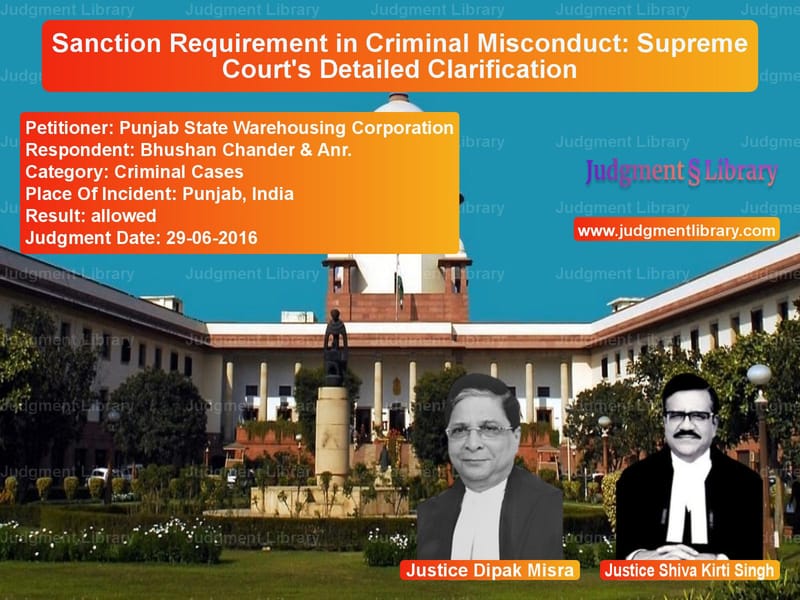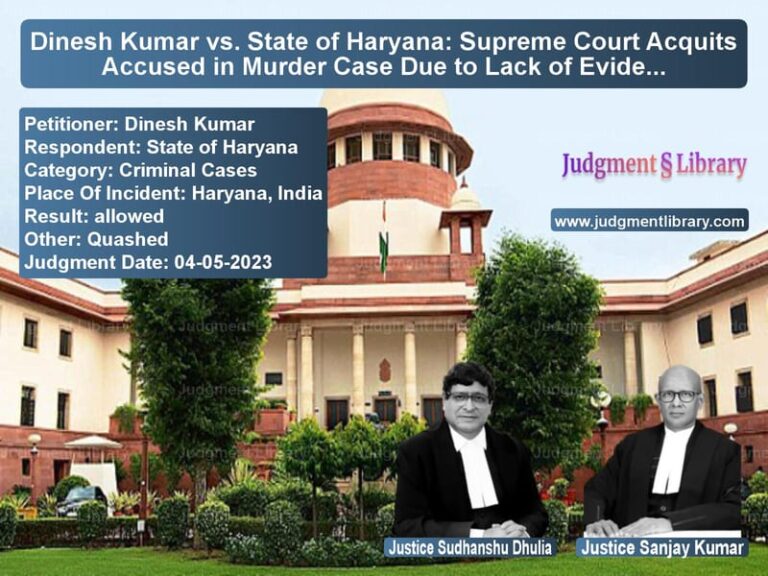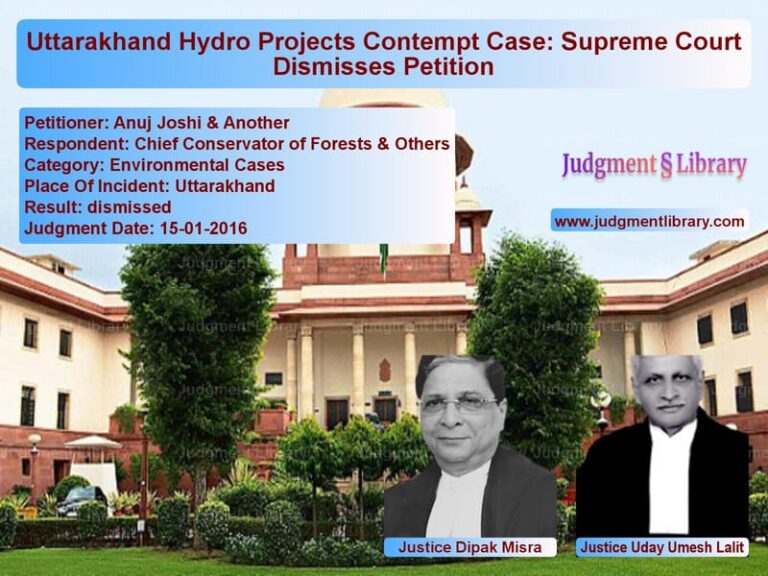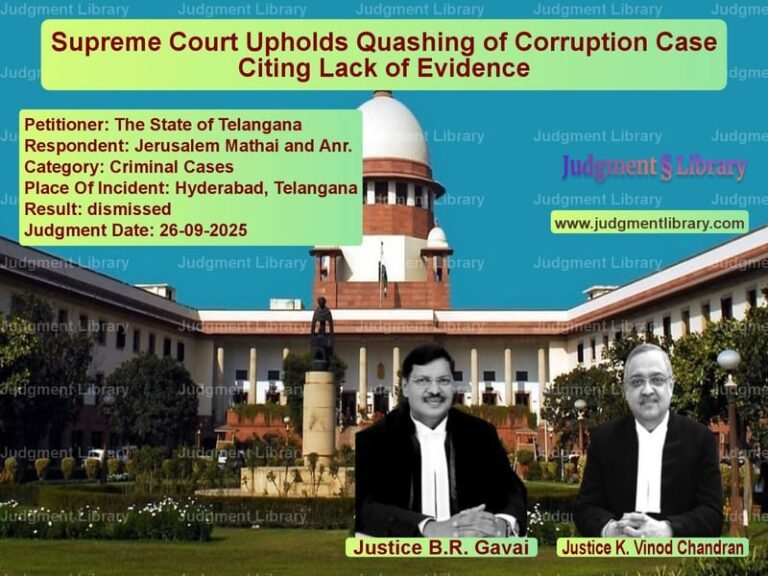Sanction Requirement in Criminal Misconduct: Supreme Court’s Detailed Clarification
The Supreme Court of India recently delivered a landmark judgment in the case of Punjab State Warehousing Corporation v. Bhushan Chander & Anr., addressing a critical issue: whether sanction under Section 197 of the Code of Criminal Procedure, 1973 (CrPC) is required before prosecuting a public servant under Sections 409, 467, 468, and 471 of the Indian Penal Code (IPC).
Introduction
The case in question revolved around the prosecution of a government employee accused of misappropriation, criminal breach of trust, and forgery. The Punjab State Warehousing Corporation filed a complaint against its employee, Bhushan Chander, alleging that he had misused his official position for personal gain. The corporation contended that the accused had unlawfully removed stock from the warehouse and tampered with official records to cover up the embezzlement. The charges framed against him included:
- Section 409 IPC – Criminal breach of trust by a public servant
- Section 467 IPC – Forgery of valuable security
- Section 468 IPC – Forgery for the purpose of cheating
- Section 471 IPC – Using forged documents as genuine
The case raised a significant legal question: does an accused public servant require prior sanction for prosecution when the alleged offense pertains to corruption and criminal misconduct?
Trial Court’s Findings
The Trial Court convicted the accused based on strong evidence, which included testimonies of officials and documentary proof. The court found that the accused had not only misused his authority but had also actively engaged in fraudulent activities that directly harmed the financial interests of the corporation. Accordingly, the court sentenced him under the relevant IPC provisions.
Sessions Court’s Confirmation
On appeal, the Sessions Court upheld the conviction but made a slight modification in the sentence. The court reinforced that the actions of the accused were independent of his official duties and thus did not warrant any legal immunity.
High Court’s Reversal
In an unexpected turn, the Punjab and Haryana High Court set aside the conviction on the grounds that the prosecution had commenced without obtaining the necessary sanction under Section 197 CrPC. The High Court reasoned that since the accused was a public servant, his actions fell within the ambit of official duty, necessitating prior approval for prosecution.
Arguments Before the Supreme Court
When the matter reached the Supreme Court, both parties presented compelling arguments.
- Respondent’s (Accused’s) Argument: The accused contended that as a warehouse officer employed by a government-controlled entity, he was entitled to protection under Section 197 CrPC. The absence of a prior sanction, therefore, rendered the prosecution illegal.
- Appellant’s (Corporation’s) Argument: The corporation argued that the offenses committed by the accused were independent of his official functions. Embezzlement and document forgery were criminal acts, and protection under Section 197 CrPC could not be extended to shield misconduct.
Supreme Court’s Legal Analysis
The Supreme Court delved into the interpretation of Section 197 CrPC, emphasizing that it only grants immunity to public servants for acts done in the discharge of official duties. The Court reiterated that this protection does not extend to criminal offenses such as misappropriation and forgery, which are done for personal benefit.
Several precedents were cited to support this view:
- Matajog Dube v. H.C. Bahri: This ruling clarified that protection under Section 197 CrPC applies only when an act is reasonably connected with official duties.
- State of Maharashtra v. Budhikota Subbarao: The Court held that public servants are not immune from prosecution if their actions exceed the scope of their official functions.
- State of H.P. v. M.P. Gupta: The Court ruled that prosecution under Section 409 IPC does not require sanction under Section 197 CrPC.
Final Judgment
The Supreme Court overturned the High Court’s ruling and reinstated the conviction. It reasoned that the accused’s actions were not done in his official capacity but were acts of personal gain. Consequently, the absence of sanction did not vitiate the proceedings.
Key Takeaways
- Sanction under Section 197 CrPC is not required for offenses involving criminal misconduct by public servants.
- Public servants cannot misuse statutory protections to shield themselves from prosecution for corruption.
- The judgment reinforces the principle that legal immunity does not extend to actions committed with criminal intent.
Conclusion
This Supreme Court ruling is a significant step in ensuring accountability among public servants. It reiterates that while legal protection is necessary for genuine official acts, it cannot be extended to cover criminal behavior. The judgment sends a clear message that individuals in positions of authority will not be allowed to exploit their roles for personal gain at the expense of public trust.
Don’t miss out on the full details! Download the complete judgment in PDF format below and gain valuable insights instantly!
Download Judgment: Punjab State Warehou vs Bhushan Chander & An Supreme Court of India Judgment Dated 29-06-2016-1741872400624.pdf
Direct Downlaod Judgment: Direct downlaod this Judgment
See all petitions in Fraud and Forgery
See all petitions in Bail and Anticipatory Bail
See all petitions in Theft and Robbery Cases
See all petitions in Judgment by Dipak Misra
See all petitions in Judgment by Shiva Kirti Singh
See all petitions in allowed
See all petitions in supreme court of India judgments June 2016
See all petitions in 2016 judgments
See all posts in Criminal Cases Category
See all allowed petitions in Criminal Cases Category
See all Dismissed petitions in Criminal Cases Category
See all partially allowed petitions in Criminal Cases Category







